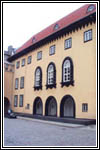 |
Vol 1, No 5, 26 July 1999
|
|
|
 T H E A M B E R C O A S T:
T H E A M B E R C O A S T:
A Hot Summer in Riga Mel Huang
As well as the temperature hitting 30C on most days, the summer has been extremely hot in Riga for other reasons, namely politics. A difficult presidential election, a government collapse, the passage of a controversial new language law and its veto, and the formation of a new government all happened within several weeks in the supposedly quiet summer period. However, as the summer moves into its second half with the traditional August holidays, a glowing glimmer of hope shines from Riga amongst the chaos. On 5 July, the government of Vilis Kristopans fell rather unexpectedly after the conclusion of a political deal between coalition member For Fatherland and Freedom and the hated centre-right opposition People's Party. Calling it plain "back-stabbing," Kristopans resigned. For many it could not have come too soon, as the government faced several crises. The minority coalition government, already embarrassed by several high-profile policy defeats (extension of the validity of privatisation vouchers, extending pork tariffs to neighbours Estonia and Lithuania), faced further uncertainty when the presidential election created an "unholy alliance" among parties in and out of the government. In electing Dr Vaira Vike-Freiberga as President on 17 June, For Fatherland and Freedom, the People's Party and the Social Democratic Workers' Party effectively sealed the fate of the Kristopans coalition. As a parting shot, a public opinion poll rated Kristopans the second most unpopular politician after Alfreds Rubiks, the former Latvian Soviet leader and opponent of Latvian independence. During the interregnum while the People's Party and For Fatherland and Freedom worked out a new government programme from the aforementioned co-operation agreement, the Saeima passed the controversial new language law by a huge margin of 73 to 16. This infuriated local opponents of the law and self-righteous minority affairs officials from international organisations, and they placed undue pressure on Vike-Freiberga not to promulgate the law. The new President, showing independence and bravado, noted several inconsistencies and problems with the law and sent it back. Though obviously it irked the new coalition, they appear to respect the decision and will review her objections when the Saeima reconvene in late August. After that dramatic episode the new government came together. Holding 62 seats in the 100-seat Saeima, People's Party leader and former Prime Minister Andris Skele returned to lead Latvia's government. The new coalition, comprised of the People's Party, Latvia's Way, and For Fatherland and Freedom, finally brings together the coalition many hoped and expected after the October 1998 general elections (see the very first Amber Coast from 14 January for more). The parties failed to come together then because of purely personal problems between Latvia's Way and People's Party leaders - and behind the scenes, between the oil transit giant Ventspils Oil and food processing conglomerate Ave Lat, linked to the two parties respectively. Promising to bury the hatchet for now, the new arrangement gives Latvia the most stable government it has had since the restoration of independence. Symbolically, Skele was greeted at his office on his first day back with a fire across the street in a business office. Immediately, he took the cue and announced his intention of putting out the biggest political fire in the country: the massive budget crisis. Following the examples set by neighbouring Estonia, the new government is working on a negative supplemental budget that would cut spending and halt the out-of-control crisis basically ignored by the ineptitude of the Kristopans regime. However, how much damage the fire will cause before being extinguished could determine the lifetime of this government. Andris Skele, for all his faults, is a person who gets things done. He is very assertive and stubborn and often does things unilaterally. The People's Party is essentially his political vehicle, with its members clearly under his ever-present thumb. Though abrasive and constantly making enemies, Skele managed to defuse several major problems during his previous stints (technically he was prime minister twice through two consecutive terms) running the country. That will likely happen again, but it will earn him even more enemies. Mel Huang, 22 July 1999 Useful links: Latvia's Government (links are to the individual ministries if available, but some are not in English) Prime Minister Andris Skele (People's Party)
|
|
![]()
Copyright (c) 1999 - Central Europe Review and Internet servis, a.s.
All Rights Reserved